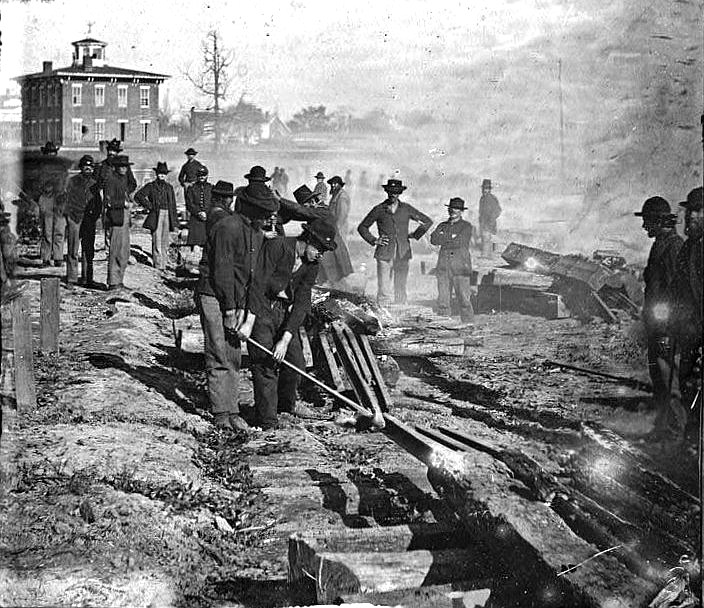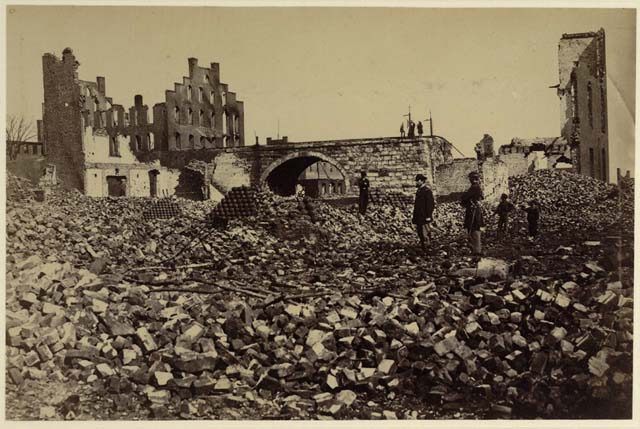Traveling South during the first stages of Reconstruction
Shortly after the war, Francis Butler Leigh, traveling with her father, left the North to reclaim their plantation in the Sea Islands. Francis chronicled her journey through the South, as well as documented the transition of Southern society from the prosperous slaveholding plantations to an economy filled with poverty stricken sharecroppers and tenant farmers, and bankrupt plantation owners. Francis’ account illuminates the disorganization, the uncertainty, and the turmoil of the South as it began the slow process of reuniting itself with the Union. Her difficult, yet somewhat humorous, week long journey through the war torn South in March of 1866 illustrates the extent of the inability of Southerners to recover after the loss of the war. The following excerpt is from her memoirs Ten Years on a Georgia Plantation since the War.
The whole country had of course undergone a complete revolution. The changes that a four years’ war must bring about in any country would alone have been enough to give a different aspect to everything; but at the South, besides the changes brought about by the war, our slaves had been freed; the white population was conquered, ruined, and disheartened, unable for the moment to see anything but ruin before as well as behind, too wedded to the fancied prosperity of the old system to believe in any possible success under the new. And even had the people desired to begin at once to rebuild their fortunes, it would have been in most cases impossible, for in many families the young men had perished in the war, and the old men, if not too old for the labour and effort it required to set the machinery of peace going again, were beggared, and had not even money enough to buy food for themselves and their families, let alone their negroes, to whom they now had  to pay wages as well as feed them.
to pay wages as well as feed them.
On March 22, 1866, my father and myself left the North. The Southern railroads were many of them destroyed for miles, not having been rebuilt since the war, and it was very questionable how we were to get as far as Savannah, a matter we did accomplish…in a week’s time, after the following adventures.
On Saturday we left [Washington], reaching Richmond at four o’clock on Sunday morning.  That day we spent quietly there, and sad enough it was, for besides all the associations with the place which crowded thick and fast upon one’s memory, half the town was a heap of burnt ruins, showing how heavily the desolation of war had fallen upon it.
That day we spent quietly there, and sad enough it was, for besides all the associations with the place which crowded thick and fast upon one’s memory, half the town was a heap of burnt ruins, showing how heavily the desolation of war had fallen upon it.
We travelled all [the next] day in the train, reaching Greensborough that night at eight o’clock. Not having been able to get any information about our route further on, we thought it best to stop where we were until we did find out. This difficulty was one that met us at every fresh stopping place along the whole journey; no one could tell us whether the road ahead were open or not, and, if open, whether there were any means of getting over it. So we crawled on, dreading at each fresh stage to find ourselves stranded in the middle of the pine woods, with no means of progressing further.
That night in Greensborough is one never to be forgotten. The hotel was a miserable tumble-down old frame house, and the room we were shown into more fit for a stable than a human habitation; a dirty bare floor, the panes more than half broken out of the windows, with two ragged, dirty calico curtains over them that waved and blew about in the wind. The furniture consisted of a bed, the clothes of which looked as if they had not been changed since the war, but had been slept in, in the meanwhile, constantly, two rickety old chairs, and a table with three legs. The bed being entirely out of the question, and I very tired, I took my bundle of shawls, put them under my head against the wall, tilted my chair back, and prepared to go to sleep if I could. I was just dozing off when I heard my maid, whom I had kept in the room for protection, give a start and exclamation which roused me. I asked her what was the matter, to which she replied, a huge rat had just run across the floor. This woke me quite up, and we spent the rest of the night shivering and shaking with the cold, and knocking on the floor with our umbrellas to frighten away the rats, which from time to time came out to look at us.
At four in the morning my father came for us, and we started for the train, driving two miles in an old army ambulance. From that time until eight in the evening we did not leave the cars, and then only left them to get into an old broken-down stage coach, which was originally intended to hold six people, but into which on this occasion they put nine, and, thus cramped and crowded, we drove for five hours over as rough a road as can well be imagined, reaching Columbia at three o’clock A.M., by which time I could hardly move.

Our next train started at six, but I was so stiff and exhausted that I begged my father to wait over one day to rest, to which he consented. At this place we struck General Sherman’s track, and here the ruin and desolation was complete. Hardly any of the townremained; street after street was merely one long line of blackened ruins, which showed from their size and beautifully laid-out gardens, how handsome some of the houses had been. It was too horrible!
On Thursday, at six A.M., we again set off, going about thirty miles in a cattle van which brought us to the Columbia River, the bridge over which Sherman had destroyed. This we crossed on a pontoon bridge, after which we walked a mile, sat two hours in the woods, and were then picked up by a rickety old car which was backed down to where we were, and where the rails began again, having been torn up behind us. In this, at the rate of about five miles an hour, we travelled until four in the afternoon, when we were again deposited in the woods, the line this time being torn up in front of us. Here, after another wait, we were packed into a rough army wagon, with loose boards put across for seats, and in which we were jolted and banged about over a road composed entirely of ruts and roots for four more hours, until I thought I should not have a whole bone left in my body.
Between nine and ten in the evening we arrived at a log cabin, where, until three A.M. we sat on the floor round a huge wood fire. The train then arrived and we started again, and did not stop for twenty-four hours; at least, when I say did not stop, I mean, did not leave the cars, for we really seemed to do little else but stop every few minutes. This brought us, at three A.M., to Augusta, where we were allowed to go to bed for three hours, starting again at six and travelling all day, until at seven in the evening we at last reached Savannah. Fortunately we started from the North with a large basket of provisions, that being our only luggage, the trunks having been sent by sea; and had it not been for this, I think we certainly should have starved, as we were not able to get anything to eat on the road….
I can hardly give a true idea of how crushed and sad the people [of Savannah] are. You hear no bitterness towards the North; they are too sad to be bitter; their grief is overwhelming….The women live in the past, and the men only in the daily present, trying, in a listless sort of way, to repair their ruined fortunes…
No matter how historians glorify battles, the aftermath is full of tragedy for the civilians as well as their military victims. Perhaps more emphasis should be given by historians to the horrors of war.
You are so right, wdonohue1- while the battles themselves are particularly horrifying in their own right, the civilians are the ones left behind to manage the homestead and the families. With the mail and news traveling slowly, the constant worry of whether or not a husband, son, or brother, survived the battles took it’s toll just as much as the battles themselves. Thanks for reading!
Reblogged this on Poore Boys In Gray.
Very interesting Ashley. Thank you for posting. It is hard to imagine the difficulties people had after the war in the south and the difficulties they had to rebuild their cities and lives.